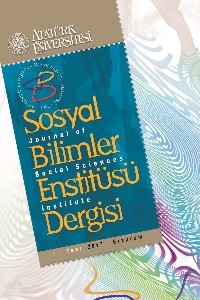Research Article
Year 2017,
Volume: 21 Issue: 1, 159 - 172, 20.03.2017
Abstract
References
- Carrell, P. L. (1989). Metacognitive Awareness and Second Language Reading. The Modern Language Journal, 73(2), 121-134.
- Cohen, J. W. (1988). Statistical power analysis for the behavioral sciences (2nd end). Hillsdale, NJ: Lawrence Erbaum Associates.
- Cubukcu F., (2008). Enhancing vocabulary development and reading comprehension through metacognitive strategies. Issues in Educational Research, 18(1),
- Dhanapala K.V., (2010). Student’s Metacognitive awareness of L2 Reading Strategies. Journal of International Development and Cooperation, Vol, 16, No.1, pp65, 82.
- Flavell, J. H., J. R. Speer, et al. (1981). "The Development of Comprehension Monitoring and Knowledge about Communication." Monographs of the Society for Research in Child Development 46(5): 1-65.
- Grabe, W. (1991). Current Developments in Second Language Reading Research. TESOL Quarterly, 25(3), 375-406.
- Hammadou, J. (1991). Interrelationships among prior knowledge, inference, and language proficiency in foreign language reading. The Modern Language Journal, 75, 27–38.
- Pressley, M. (2002). Metacognition and self-regulated comprehension. What research has to say about reading instruction, 3, 291-309.
- Pressley, M., & Fingeret, L. (2005). What We Have Learned Since the National Reading Panel: Visions of a Next Version of Reading First.
- Ronzano S.J, (2010). Effectiveness of Metacognitive Strategies for Improving Reading Comprehension in Secondary Students. UMI Number: 342744.
- Sheoreya R., Mokhtari K, (2001). Differences in the meta-cognitive awareness of reading strategies among native and non-native readers. System 29 (2001) 431–449.
- Tierney, J. E. R. R. J. (Ed.). (2005). Reading Strategies and Practices (Sixth ed.). Boston:Pearson Education, Inc.
- Turan T., Tolga K., Saadet Aylin Bayarc, Volkan, (2010). BayarcMetacognitive awareness of grades 6, 7 and 8 students in reading process. Procedia Social and Behavioral Sciences 2. 4193–4199. Elsevier.
- Takallou F. (2011). The Effect of Metacognitive Strategy Instruction on EFL Learners’ Reading Comprehension Performance and Metacognitive Awareness. Asian EFL Journal.
- Wang M.T , (2009). An Effects of metacognitive reading strategy instruction on efl high school students’ reading comprehension, reading strategies awareness, and reading motivation. UMI 3400319.
- Zhang L.J, (2009). Chinese senior high school EFL students’ meta-cognitive awareness and reading-strategy use. Reading in a Foreign Language April 2009, Volume 21, No. 1 l. 16 (2), 2002.
- Zhang, L. and Seepho, S. (2013). Metacognitive Strategy Use and Academic Reading Achievement: Insights from a Chinese Context. Electronic Journal of Foreign Language Teaching. Vol. 10, No. 1, pp. 54-69.
Year 2017,
Volume: 21 Issue: 1, 159 - 172, 20.03.2017
Abstract
References
- Carrell, P. L. (1989). Metacognitive Awareness and Second Language Reading. The Modern Language Journal, 73(2), 121-134.
- Cohen, J. W. (1988). Statistical power analysis for the behavioral sciences (2nd end). Hillsdale, NJ: Lawrence Erbaum Associates.
- Cubukcu F., (2008). Enhancing vocabulary development and reading comprehension through metacognitive strategies. Issues in Educational Research, 18(1),
- Dhanapala K.V., (2010). Student’s Metacognitive awareness of L2 Reading Strategies. Journal of International Development and Cooperation, Vol, 16, No.1, pp65, 82.
- Flavell, J. H., J. R. Speer, et al. (1981). "The Development of Comprehension Monitoring and Knowledge about Communication." Monographs of the Society for Research in Child Development 46(5): 1-65.
- Grabe, W. (1991). Current Developments in Second Language Reading Research. TESOL Quarterly, 25(3), 375-406.
- Hammadou, J. (1991). Interrelationships among prior knowledge, inference, and language proficiency in foreign language reading. The Modern Language Journal, 75, 27–38.
- Pressley, M. (2002). Metacognition and self-regulated comprehension. What research has to say about reading instruction, 3, 291-309.
- Pressley, M., & Fingeret, L. (2005). What We Have Learned Since the National Reading Panel: Visions of a Next Version of Reading First.
- Ronzano S.J, (2010). Effectiveness of Metacognitive Strategies for Improving Reading Comprehension in Secondary Students. UMI Number: 342744.
- Sheoreya R., Mokhtari K, (2001). Differences in the meta-cognitive awareness of reading strategies among native and non-native readers. System 29 (2001) 431–449.
- Tierney, J. E. R. R. J. (Ed.). (2005). Reading Strategies and Practices (Sixth ed.). Boston:Pearson Education, Inc.
- Turan T., Tolga K., Saadet Aylin Bayarc, Volkan, (2010). BayarcMetacognitive awareness of grades 6, 7 and 8 students in reading process. Procedia Social and Behavioral Sciences 2. 4193–4199. Elsevier.
- Takallou F. (2011). The Effect of Metacognitive Strategy Instruction on EFL Learners’ Reading Comprehension Performance and Metacognitive Awareness. Asian EFL Journal.
- Wang M.T , (2009). An Effects of metacognitive reading strategy instruction on efl high school students’ reading comprehension, reading strategies awareness, and reading motivation. UMI 3400319.
- Zhang L.J, (2009). Chinese senior high school EFL students’ meta-cognitive awareness and reading-strategy use. Reading in a Foreign Language April 2009, Volume 21, No. 1 l. 16 (2), 2002.
- Zhang, L. and Seepho, S. (2013). Metacognitive Strategy Use and Academic Reading Achievement: Insights from a Chinese Context. Electronic Journal of Foreign Language Teaching. Vol. 10, No. 1, pp. 54-69.
There are 17 citations in total.
Details
| Primary Language | Turkish |
|---|---|
| Journal Section | Makaleler |
| Authors | |
| Publication Date | March 20, 2017 |
| Published in Issue | Year 2017 Volume: 21 Issue: 1 |
ATASOBED- Atatürk Üniversitesi Sosyal Bilimler Enstitüsü Dergisi Creative Commons Atıf-GayriTicari-AynıLisanslaPaylaş 4.0 Uluslararası Lisansı ile lisanslanmıştır.



